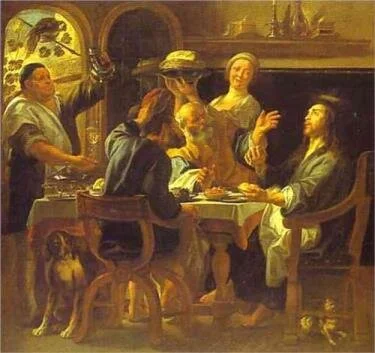His purpose was to create in himself one new humanity out of the two, thus making peace. Ephesians 2:15
Supper at Emmaus, Jacob Jordaens
On the first day of the week, very early in the morning, the women took the spices they had prepared and went to the tomb. They found the stone rolled away from the tomb, but when they entered, they did not find the body of the Lord Jesus. While they were wondering about this, suddenly two men in clothes that gleamed like lightning stood beside them. In their fright the women bowed down with their faces to the ground, but the men said to them, ‘Why do you look for the living among the dead? He is not here; he has risen! Remember how he told you, while he was still with you in Galilee: “The Son of Man must be delivered over to the hands of sinners, be crucified and on the third day be raised again.”’ Then they remembered his words. (Luke 24:1-8)
Relating is at the heart of what is redemptive, and what may bring about the transformation of the world. Mary Grey
A disturbing shift
Rowan Williams comments of the resurrection that it is the ordinariness that is so unsettling.
'The Jesus who belongs with God, is disturbingly like meeting any human being - disturbingly, because the shift of perspective which recognition and confession involve is that much more drastic....to meet an exalted, apotheosized (deified, glorified, idealised) human being in vision like the first chapter of the Apocalypse makes some kind of sense; but to meet him on a road or around a table is far more bewildering....The risen Jesus is 'going up' to the Father, yet without simply sloughing off the human condition.'
Jesus continues to touch and be touched, to eat and to talk, in short to be human and to underline and enable ongoing yet transformed human relating. He gathers up and into himself inner and outer, differences and contrasts, reconciling the marginal and the fundamental in one broken and risen body.
Andrew Hook












